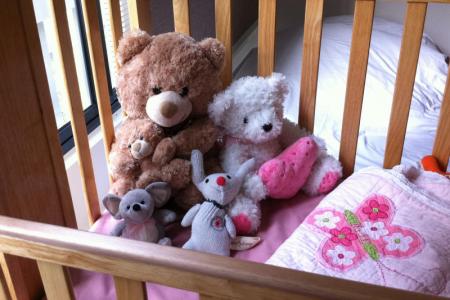Why it's so hard to talk about stillbirth in S'pore
Grieving for a baby who’s suddenly gone is hard, but it is possible to find non-judgemental help in Singapore
Experiencing a pregnancy loss is never easy, but it is perhaps especially hard for mothers who lose a child to stillbirth or lose the child very soon after birth.
As stillbirths occur after the 28th week of pregnancy, parents would have at least seven months to bond with their baby, build dreams, discuss names, and suddenly those dreams are gone.
Christiano Ronaldo and his partner Georgina Rodriguez recently announced the death of their newborn son. While the couple is taking steps to move on, anyone who has lost a baby to stillbirth or miscarriage will recognise the storm of emotions the couple is feeling.
Every year, around 80 to 120 women in Singapore suffer a stillbirth. There are known risk factors, such as mothers who are obese or those who smoke being at higher risk. But most stillbirths happen to healthy women who have no prior medical condition. About one in three are unexplained, which means parents often feel confused, guilty and shocked after a stillbirth.
It’s hard to talk about losing a new baby. But therapists say talking does help save lives and soothe wounded hearts.
We’ve put together some questions about stillbirth and miscarriage – including where to find non-judgemental support for bereaved parents in Singapore.
How is a stillbirth different from a miscarriage?
Miscarriages usually happen early in a pregnancy — eight out of 10 occur in the first three months. Some miscarriages can be so early in the pregnancy that the woman does not even realise she is pregnant. She may assume she had an unusually heavy period flow that month.
“Stillbirth occurs in the later stages of pregnancy, a stage usually deemed to be the 'safe zone'," said Ms Linda van Laer, a counsellor with Alliance Counselling that specialises in bereavement help for women and families. "So it can be more physically and emotionally intense than a miscarriage."
Professor Tan Kok Hian, Head of the Perinatal Audit and Epidemiology Unit, Division of Obstetrics and Gynaecology at KK Women’s and Children’s Hospital (KKH), said stillbirth and miscarriage are separately defined.
"Not because one or the other is an easier or more difficult loss to deal with, but because they differ in many ways," Prof Tan explained.
Why do stillbirths occur?
Stillbirth can be caused by a number of reasons, including issues with the placenta or umbilical cord, high blood pressure, infections, and more.
A stillbirth can happen to pregnant women of any age, background, or race, and they can be unpredictable — around 25 per cent of cases go unexplained.
Said Prof Tan: “The risk is a bit higher for couples who have already had one stillbirth”. However, he reassured that most women can go on to have a healthy pregnancy after a stillbirth.
“With increased knowledge and better treatment of maternal conditions, the number of stillbirths has decreased.”
How do stillbirths affect mothers?
Ms Ang Lee Beng, Master Medical Social Worker and Chairperson of the KKH Bereavement Support Committee, said mothers go through emotions such as panic and fear. They may even feel disbelief and confusion, especially when they had a smooth pregnancy.
“Some mothers may even blame themselves for not being attentive to their symptoms or their body,” said Ms Ang.
Ms van Laer sees similar reactions. "Guilt and self-blame is a common reaction during the grief process.”
Some women even feel their body is “broken”, said Ms van Laer. "They doubt they will be able to carry a baby – especially if they have had to give birth to their deceased baby."
Yes, unfortunately, with a stillbirth, a mother is encouraged to go through with labour and give birth naturally. It’s because a Caesarean is a major operation with risks of its own.
Ms Felicia Tan, the founder of Angel Hearts, has lost a child herself, so she understands what it is like.
“Some women feel the family or husband are not as understanding or supportive," she said. The situation could be hard to navigate for both parties, as it is "an unknown territory".
How do fathers feel about stillbirth?

Even if they are heartbroken, men can find it hard to ask for support.
“In most cultures, there is more acceptance for women to show their grief openly. Men are conditioned to grieve differently,” said Ms van Laer.
“Men often worry that sharing their grief with their partner will only add to her sadness.”
Fathers may have felt helpless as they stood by while their partner delivered their deceased baby, added Ms van Laer.
How does a stillbirth affect the relationship between parents?
Grief always has a way of affecting relationships. While bereaved parents may both be experiencing grief at the same time, it doesn’t necessarily mean they are mourning together.
“Each partner will move through the grief process at their own pace, in their own way,” said Ms Van Laer. This can cause friction because one party may feel like the other is less affected by the loss and that they are not on the same page.
Thinking back to her own experiences of losing a child, Tan said she did not know how to communicate with her husband.
"How am I supposed to communicate and explain what I need when I don’t even know how I feel?” Ms Ang shared.
Yet, she stressed the important thing is to keep trying to communicate with each other.
Why we should talk about the stigma around stillbirth or losing a baby
Research shows that many bereaved parents feel they are blamed for the deaths of their babies and do not have the right to grieve because they are silenced when they want to speak about them. This makes the topic of suffering from a stillbirth a taboo.
Research also finds that bereaved parents can be cut off by friends, or are sometimes accused of aborting their baby when it isn’t true. Often they are encouraged to forget about the baby and try for another.
Why does this line of thinking still exist in the 21st century?
“There is still considerable stigma and discomfort surrounding the topic of stillbirth," said Ms van Laer. "It’s partly because people don’t know how to talk to bereaved parents about their loss.”
“It can make bereaved parents feel even more isolated or rejected – it’s like their loss is a non-event."
Ms Ang said that bereaved parents can feel very alone in their grief. For example, while they may see themselves as parents , others may not see it that way. So special days such as the child’s birthday may pass unmarked by the rest of the family.
“Opportunities to share memories and thoughts of their baby during special anniversaries are also reduced over time," Ms Ang added.
Where to find stillbirth or early death support in Singapore
Ms Ang said that after the stillborn child is delivered, the medical and nursing team at KKH will arrange a single room so that the couple can spend time together bonding with their baby by holding their baby. taking photos or even arranging for their own parents to join them.”
The ward staff will also help capture handprints and footprints of the babies. Parents are also offered informational brochures on grief and loss, and a memory box to contain these memories of their child.
Ms van Laer said her most important job is to “provide a safe and compassionate space where a mother can freely share her experience, her thoughts, and her feelings”.
For those looking for other forms of support, Angel Hearts has two therapy programmes: Sewing 101 and the Grief Recovery Method.
During the Sewing therapy, clients deconstruct wedding dresses, a symbol of love and happiness, into funeral clothing for babies.
Sewing 101 also gives bereaved mothers the chance to confront their grief and work through their emotions through the act of sewing, which Ms Tan said is "therapeutic”.
The Grief Recovery Method is a course to learn to understand that grief is part of the process. It can be conducted individually, or in a group.
This article was first published in The Singapore Women's Weekly.
Get The New Paper on your phone with the free TNP app. Download from the Apple App Store or Google Play Store now



